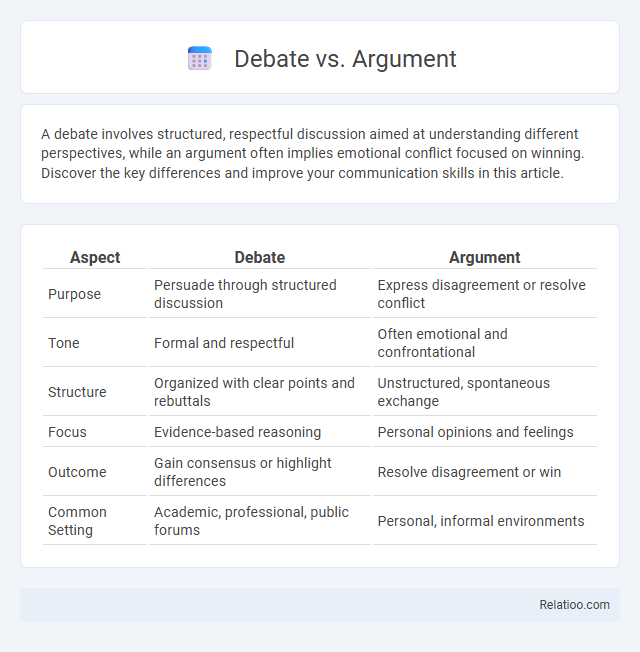A debate involves structured, respectful discussion aimed at understanding different perspectives, while an argument often implies emotional conflict focused on winning. Discover the key differences and improve your communication skills in this article.
Table of Comparison
| Aspect | Debate | Argument |
|---|---|---|
| Purpose | Persuade through structured discussion | Express disagreement or resolve conflict |
| Tone | Formal and respectful | Often emotional and confrontational |
| Structure | Organized with clear points and rebuttals | Unstructured, spontaneous exchange |
| Focus | Evidence-based reasoning | Personal opinions and feelings |
| Outcome | Gain consensus or highlight differences | Resolve disagreement or win |
| Common Setting | Academic, professional, public forums | Personal, informal environments |
Understanding Debate and Argument: Key Differences
Debate involves structured discussion with clear rules and goals, aiming to persuade an audience through logical reasoning and evidence, while an argument centers on expressing differing opinions, often more emotionally charged and less formal. You can recognize debate by its emphasis on respectful, rule-based exchanges designed to explore topics thoroughly, whereas arguments may escalate into conflicts without formal resolution. Understanding these differences helps you engage more effectively in conversations by choosing the appropriate approach for clarity or persuasion.
Definitions: What is a Debate? What is an Argument?
A debate is a structured discussion where two or more participants present opposing viewpoints on a specific topic, aiming to persuade an audience through logic and evidence. An argument involves exchanging reasons or evidence to support or oppose an idea, often with the goal of proving a point rather than reaching mutual understanding. Understanding the distinctions helps you engage effectively in discussions by recognizing when a conversation is formal and goal-oriented versus when it is a confrontational clash of opinions.
Purpose: Debate vs Argument in Communication
Debate aims to explore different perspectives through structured dialogue, fostering understanding and critical thinking, while an argument often seeks to prove one's point to win or dominate the conversation. Disagreement simply reflects a difference in opinions without necessarily involving the formal or persuasive elements found in debates or arguments. Your communication benefits from recognizing these distinctions to engage more effectively and achieve clearer outcomes.
Structure and Rules: Debate versus Argument
Debates follow a formal structure with clearly defined rules, speaking turns, and time limits to ensure orderly discussion and fairness, often guided by a moderator. Arguments are less structured, allowing more spontaneous exchanges where participants respond directly to points without strict rules or time constraints. Disagreements may lack any formal structure or rules, representing informal conflicts in opinion without the organization or protocol seen in debates or arguments.
Emotional Factors: Rationality in Debate, Emotion in Argument
Debate emphasizes rationality, where You present structured arguments supported by evidence, aiming for logical persuasion rather than emotional appeal. In contrast, an argument often involves heightened emotions, where personal feelings and passion can influence the exchange, sometimes overshadowing logical reasoning. Disagreement may arise from differing perspectives and emotional biases, leading to conflict without the formal structure or objective focus seen in debates.
Outcomes: Resolving Conflicts through Debate and Argument
Debate and argument both aim to explore different viewpoints but debate emphasizes structured dialogue to reach mutual understanding, whereas argument often centers on proving a point, which can escalate conflicts if unmanaged. Disagreement highlights the presence of opposing views but does not inherently suggest resolution, often remaining unresolved without effective communication. Prioritizing debates for conflict resolution facilitates clearer outcomes by encouraging logical reasoning and empathy, while unproductive arguments may deepen divisions.
Contexts: Where Debates and Arguments Commonly Occur
Debates commonly occur in formal settings such as academic institutions, political arenas, and public forums where structured dialogue aims to explore differing viewpoints objectively. Arguments are frequently found in everyday social interactions, workplaces, and personal relationships, often arising from emotional or conflicting interests. Your understanding of these contexts helps navigate disagreements, which typically happen in informal situations where parties hold opposing opinions without necessarily seeking resolution or consensus.
Strategies: Effective Techniques in Debate and Argument
Mastering effective techniques in debates involves presenting clear evidence, maintaining respectful tone, and actively listening to opposing views to strengthen your position. In arguments, employ logical reasoning, avoid fallacies, and focus on finding common ground to resolve conflicts constructively. When facing disagreements, prioritize empathy, clarify misunderstandings, and use strategic questioning to transform conflict into productive dialogue for your benefit.
Impact: Influence on Relationships and Decision-Making
Debate fosters constructive communication that sharpens critical thinking and often strengthens relationships by encouraging mutual respect and understanding. Argument tends to create emotional tension, potentially damaging trust and obstructing effective decision-making due to heightened defensiveness. Disagreement, when managed respectfully, allows you to explore diverse perspectives without conflict, maintaining healthy relationships and facilitating collaborative solutions.
Choosing the Right Approach: When to Debate or Argue
Understanding when to debate or argue impacts the effectiveness of your communication, especially in professional or personal settings. Debate involves structured reasoning aimed at exploring different perspectives, ideal for formal contexts or intellectual discussions, while arguing often centers on defending personal views, making it suited for resolving conflicts or differences. Recognizing the nature of your disagreement helps you choose the right approach, ensuring your message is clear and your relationships remain intact.

Infographic: Debate vs Argument
 relatioo.com
relatioo.com